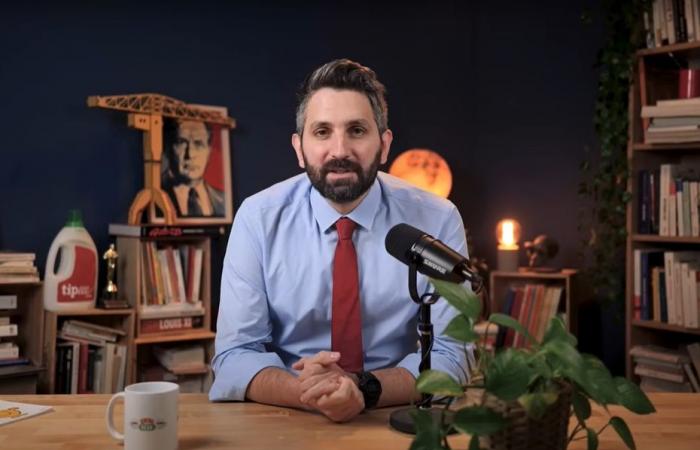
The Nouvelle-Aquitaine region has teamed up with l’Esprit critique, a team of influencers, to develop a program called Cogito. Their objective: to develop critical thinking among young people when faced with multiple sources of information.
Company
From daily life to major issues, discover the subjects that make up local society, such as justice, education, health and family.
France Télévisions uses your email address to send you the “Society” newsletter. You can unsubscribe at any time via the link at the bottom of this newsletter. Our privacy policy
On Instagram or TikTok, they are legion. Videos, where people, in front of the camera, present their point of view, give their opinion and comment on events. This content, viewed thousands of times, influences its viewers, sometimes at the risk of conveying false information.
This elusive flow of words from influencers or politicians, the Esprit critique team, from Sciences Po Paris, decided to dissect it and analyze it to avoid falling into the traps of manipulation. “Young and older people are worked on for several hours a day with content that does not demonstrate much critical thinking. And to this is added artificial intelligence which creates algorithm bubbles and locks us into our biases,” explains François Morin, development manager at Esprit critique.
With more than 700,000 subscribers on Instagram and 253,000 on YouTube, the channel's reputation has resonated even in regional political authorities. After a first program, their second, Cogito, attracted the Nouvelle-Aquitaine region. It will be offered next April to 1,800 students in the region.
The tone is falsely snobbish. The silences as complicit as they are mocking. On their Youtube channel and in their Instagram videos, Esprit Critique wants “develop critical thinking in the face of political and media discourse”. “We all have forms of inertia, obstacles, biases, things that prevent us from really thinking in the fairest way possible”, explains François Morin.
Under their videos, the feedback from thousands of Internet users and people who have followed their training is unanimous. “Critical thinking is very important, it is highly valued and expectations are high in this area”evokes François Morin. Although popular, the skill is still difficult to apply. “When it comes to defining the scope and thinking about how to teach it, there is no one left. In people's minds, it is something very diffuse”notes the man who, at the same time, coaches students in competitive exams for major schools and universities.
Faced with this observation, Critical Mind therefore decides, with its means, to awaken these capacities. “It’s not something we have a priori. So we said to ourselves that we needed to equip a lot of people more seriously with a program and training”explains the channel’s development manager.
We must recreate collective intelligence, be less stupid together.
François Morin,Member of Critical Mind
The channel will therefore launch Cogito, a program aimed at both young people and adults to sharpen their senses in the face of the streams of discourse poured out in the media and on our phones. “It is the urgency of the moment which allows, because all the subjects are discussed, to evoke all the other emergencies of societyargues François Morin. There is so much misinformation, so many contrary elements that today it is essential that everyone is equipped with this key, because there are many external forces that work in the other direction.
The program, established over 18 hours, is based on “concrete facts” seen in the media. It is divided into 12 themes such as argumentation, doubt or fakery and manipulation. “In each theme, we will work on the analysis of information, argumentation, open-mindedness and ethical reflection and a part on how to reflect on my own thinking and my own biases, François Morin list. There will be no policy to remain neutral as much as possible. We will talk about sport, science, everyday life, culture.”
If 80% of an age group can pass it at 17, that would already be great.
François Morin,Critical Thinking Development Manager
Throughout the course, personal assessments will be carried out to move to the next level and ensure “to have understood well”. However, Esprit critique wanted to make these skills a real skill “to put in the CV”. “We imagine this certification, which is still being developed, in around forty questions, with videos projected in collective rooms”, explains François Morin.
A sort of road code for critical thinking, although difficult to put in place. “We work with academics to try to evaluate critical thinking in an incontestable and consistent way, although it is not like in mathematics, or it is good or not good”raises the critical thinking development officer.
An experiment which directly appealed to the Nouvelle-Aquitaine Region, the first in France to partner with the media. “We have been attracted to media education in the broad sense for a long timesays Bixente Etcheçaharreta, regional advisor in charge of communication. Today, there are new phenomena of disinformation and AI that try to fool users. We therefore had to take this turn to continue our mission of education and the fight against disinformation.”
In total, 1,800 young people in the region will have access to this online program. “These are high school students who have already participated in the press galleries. There are also representatives of the regional youth council, indicates Bixente Etcheçaharreta.
If the experiment is significant, we then consider extending it on a larger scale.
Bixente EtcheçaharretaRegional advisor in charge of communications
Generalizing this teaching to an entire generation is also the request of many high school principals who have heard of the program. “They are confronted with these issues on a daily basis and see in Cogito an interesting tool adapted to the codes of younger generations”, explains the spokesperson for the Region.
A desire for which the region announces spending 60,000 euros, the price of these training courses distributed to 2,000 students in the region. If the project is still in the experimental stage, the region plans to pass certification “in the regional hotel and in the various sites in the region” to the students concerned. “We are very interested in innovations in this area to offer this certification which can enhance the investment”indicates Bixente Etcheçaharreta.
Online, the channel launched a fundraiser to finance the program. In just a few months, she raised more than 1.7 million euros. Enough to allow them to offer this program in two versions, “advanced” and “expert”.





